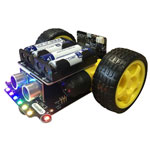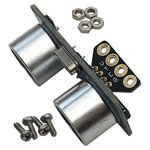If you have a
BBC micro:bit then you should get the Robo:Bit buggy. Using the basic kit, you can learn about controlling motors and use the accelerometers or compass on the micro:bit to aid navigation and collision detection. You can also make a very cool remote control robot by using another micro:bit and the radio function.
The
Robo:Bit buggy can be assembled very quickly using only a screwdriver. No soldering is required making it a great beginners kit and the chunky wheels and powerful motors mean it works well on any surface.
There are also available a number of optional accessories to make the Robo:Bit buggy even more versatile:
The
Ultrasonic Distance Sensor (
75-0146) lets the robot detect objects before it collides with them allowing you to program it to avoid them. It can also be used to create a 'follow me' program where the robot tries to stay a certain distance from the object in front of it.
Robo:Bit has been cleverly designed so that with a few hexagonal pillars and screws, you can fit the motors, battery box, front casters, line following sensors and even ultrasonic distance sensors and have a very neat and simple robot!
Robo:Bit uses the ever popular DRV8833 motor driver which allows you to use most small motors that operate in the 3 to 6V range.
Connections are provided for lots of the BBC micro:bit pins, and all have immediate 3-pin access to power (3.3V) and ground. There are three separate pins for 5V if you need the extra voltage (but don't feed back 5V to the micro:bit as it won't like it!). This is the GVS (Ground, Volts, Signal) system for sensors and servos etc.
On the left side of the board (the 'front' of the robot) is a set of 4 offset holes into which you can simply poke an HC-SR04 ultrasonic distance sensor. The offset holes and gold plating ensure a good connection, but you can also solder it in permanently for added robustness.
Also available is the
Robo:Bit MK3 (
75-5014) that includes, along with the buggy, the line following sensor, ultrasonic distance sensor, integrated pen holder, and the LED light bar.



